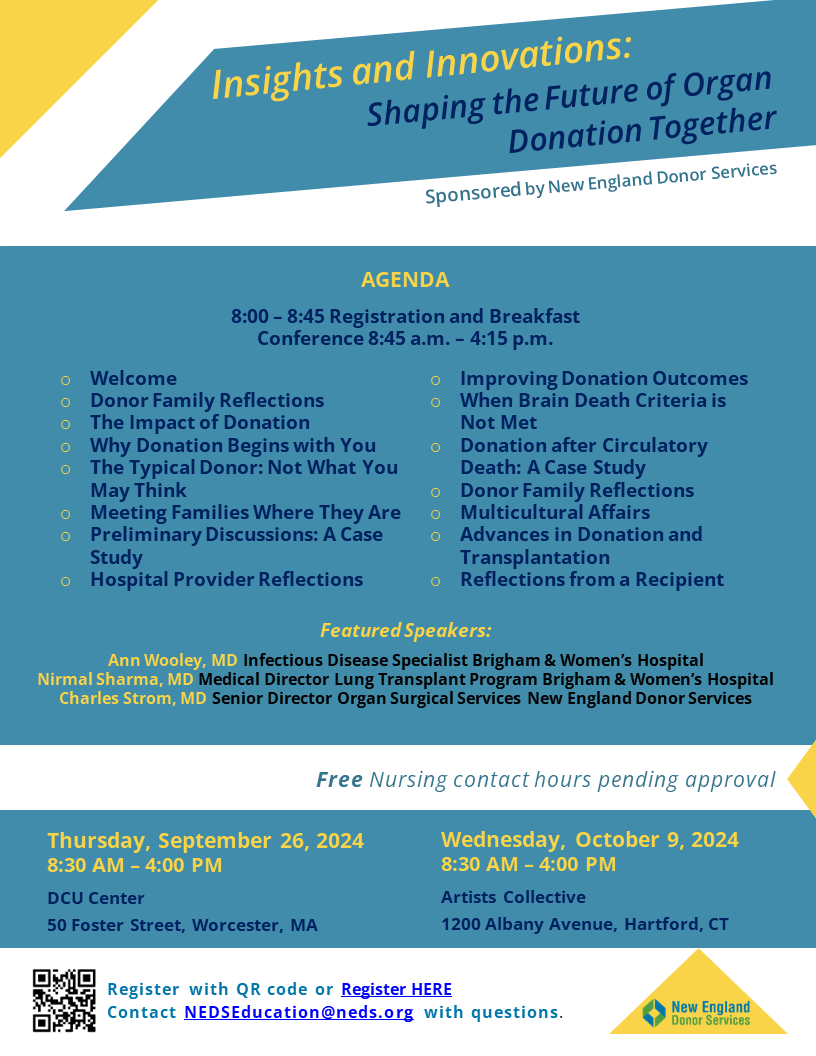Hospital Education
Upcoming Symposium
Learning Symposium September 26 and October 9, 2024!
Click here to register for Insights and Innovations: Shaping the Future of Organ Donation Together.
Thank you!!
Contact Hour Programs
The following programs are approved for 1.0 Nursing Contact Hours:
1. Overview of Organ and Tissue Donation
This program provides an overview of the donation processes starting with the clinical cues for a timely referral for donation through to the recovery of organ and tissues. Role of hospital staff in the donation process is also discussed.
Learning Objectives:
- State clinical cues for a timely referral to NEDS and other organ and tissue donation CMS Conditions of Participation for Hospitals
- Discuss role of hospital staff in the organ and tissue donation processes
- Compare and contrast Donation after Brain Death and Donation after Circulatory Death processes
2. The Organ and Tissue Recovery Process
This programs provides an overview of the donation processes starting with a referral to New England Donor Services through organ and tissue recovery. The recovery process, supplies needed and role of anesthesia and OR staff are reviewed in detail.
Learning Objectives:
- Compare and contrast Donation after Brain Death and Donation after Circulatory Death processes
- Discuss role of anesthesia and OR staff in the donation process
- Discuss specific supplies needed for organ recovery
To request a program, contact your Hospital Relations Coordinator or send an email to NEDSeducation@neds.org.
Grand Round Lectures
1. The Diagnosis of Brain Death and Organ Donation
This session covers the mechanism of brain death, recommended testing by the American Academy of Neurology and addresses unusual challenges seen with the declaration process.
- Discuss common neurological insults and medical interventions
- Discuss pathology of brain death and herniation process
- State required and ancillary testing for diagnosis of brain death
- Discuss potential complications in brain death declaration
- State clinical cue for timely referral to NEDS
2. Clinical Management of the Potential Donor
This session covers the critical role of the intensivist in the donation process. It describes the multifaceted procedures including organ evaluation, testing and optimization strategies to maximize donation potential with the goal of transplanting as many recipients as possible.
- Describe a potential donor candidate and clinical cue for timely referral to NEDS
- Discuss role of the intensivist in preserving donation option
- Describe multifaceted steps of donation process and timing
- Discuss impact of multidisciplinary staff in optimizing donation potential
- Discuss related literature
To request a program, contact your Hospital Relations Coordinator or send an email to NEDSeducation@neds.org.
Other Education
Inservices
New England Donor Services offers 10 – 20 minute informal education on the referral and collaborative donation process. To request new hire orientation inservices, physician resident education or other education, contact your Hospital Donation Strategist or send an email to NEDSeducation@neds.org.
Online Programs
The following e-learning programs are available in web and LMS formats:
- Overview of Organ and Tissue Donation
- Supporting the Opportunity for Donation
- Organ and Tissue Donation for the Critical Care Professional
- The Collaborative Donation Process
- Assessing Family Readiness for a Timely Discussion by NEDS
- Organ Recovery Process for Surgical OR Staff
To request a program, contact your Hospital Donation Strategist or send an email to NEDSeducation@neds.org.

